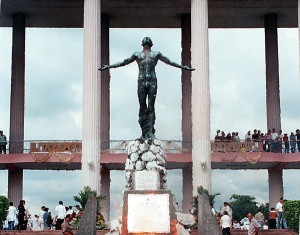MANILA, Philippines–The Aquino administration’s controversial Disbursement Acceleration Program (DAP) did not achieve its goal of fast-tracking public spending in the country’s premier university, state auditors found.
The Commission on Audit (COA) found too slow the implementation of P1.2 billion worth of DAP-funded infrastructure projects on various campuses of the University of the Philippines (UP) in 2013.
In its audit report for 2013 released on Wednesday, the COA reported that P1.2 billion was released to the UP System in September 2012 from the DAP through the Commission on Higher Education (CHEd).
The funds were intended to finance 46 infrastructure projects. By the end of 2013, however, only a “minimal” 28 percent of the funds, or P362 million, had been used, the COA said.
“The slow implementation resulted in unspent funds of P928.7 million, contrary to the DAP’s objective of fast-tracking expenditures to improve the country’s competitiveness,” the COA said.
State auditors attributed the slow project implementation to “delayed/slow procurement process.”
UP officials could not immediately give an update on the DAP projects listed in the COA report.
The audit body recommended that UP review the projects, as the completion of some of them may have been compromised by the Supreme Court’s July 1, 2014, decision declaring the DAP unconstitutional.
“We recommend that management evaluate the extent of implementation of the projects if [they] fall within the context of the Supreme Court decision, and fast-track the implementation of the projects already in the pipeline before the issuance of the Supreme Court decision,” the COA said.
In that unanimous decision, the Supreme Court nullified the way President Aquino and Budget Secretary Florencio Abad funneled government “savings” to other projects outside the Congress-approved national budget.
Malacañang defended the DAP as a stimulus package designed to speed up public spending and push economic growth.
Of the P1.2 billion in DAP funds released by the CHEd to UP in September 2012, a third, or P431.9 million, went to the UP System Administration. Of that amount, only 33 percent had been spent by the end of 2013.
The funds would go to three projects: faculty and staff housing (P197.9 million), eUP component 4 infrastructure development (P198 million), and renovation of the UP Quezon Hall administration building (P35.9 million).
UP Diliman received the next largest share, P321.7 million (34 percent used); UP Cebu, P111.8 million (24 percent used); UP Manila, P95 million (3 percent used); UP Philippine General Hospital, P140.5 million to purchase MRI, CT scan and other urgently needed equipment (13 percent used).
UP Los Baños received P78.2 million (15 percent utilized); UP Baguio, P41.5 million (86 percent used); UP Open University, P29.7 million (17 percent used); UP Mindanao, P25.7 million (22 percent used) and UP Visayas, P13.8 million (29 percent used).
According to the COA, UP received P1.8 billion from the DAP from 2011 to 2013, including the windfall of P1.2 billion in 2012 from the CHEd.
The rest of the DAP funds came from the Department of Budget and Management and the Department of Science and Technology.
Unlike the P1.2 billion from the CHEd, the DAP funds coursed through the DOST amounting to P437.5 million was 89 percent used as of end 2013 for the UP-DOST Disaster Risk Exposure Assessment and Mitigation (Dream) project.
The UP team in charge of the project explained the delay in their timetable to the delay of about nine months in acquiring the Light Detection and Ranging (Lidar) equipment and the lease of aircraft services.
Using Lidar technology, a team of UP geologists and engineers produced flood hazard maps of the country’s major river basins to enable local governments to issue flash flood and landslide warning once a forecast amount of rainfall has occurred.
In the same report, the COA also ordered UP to return to the national treasury P155.2 million in unused money from the Priority Development Assistance Fund (PDAF) to comply with the Nov. 19, 2013, Supreme Court decision on the pork barrel.
The COA said that from 2000 to 2013, UP Diliman and UP Manila, UP Open University and UP-PGH received P1.56 billion in pork barrel funds from lawmakers.
RELATED STORIES
COA notes irregularities in PGH pork
4 accused of graft for bid to oust president of Manila university


